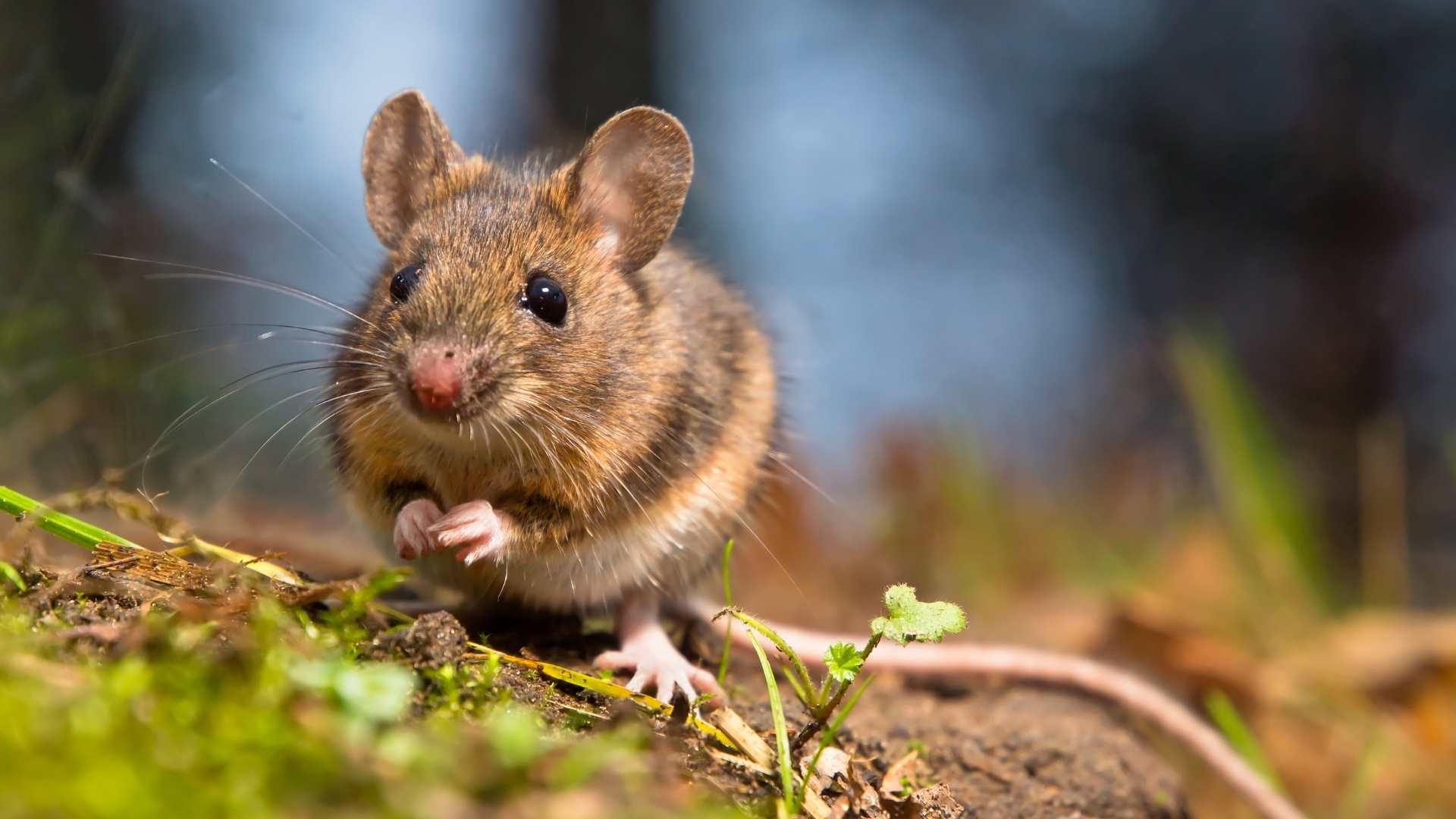Ever been sitting at home relaxing? Then you spot a small rodent from the corner of your eye?
As you turn your head, you realize it is a mouse, and your heart sinks as you ponder the question:
I wonder how many more there are?
It is a big question! And one that is difficult to answer too.
You might reasonably assume you have more when seeing one mouse, and you might be right!
So if I told you that 1 mouse could turn into 127 mice within 147 days, would that concern you?
How many mice do you have?
The short answer is if you:
- Have only just heard or seen the mouse
- Haven’t noticed any more signs
Then you may have got lucky! You may only have one mouse.
However, if you hear mice regularly and see droppings and gnawed items, you will likely have more mice.
Recommended reading: Hunting down common points of entry for mice. That knowledge is vital for keeping them out of your house, and winning the rodent war!
The first question you need to ask is:
How long has the mouse been in my house?
How Long Has The Mouse Been In My House?
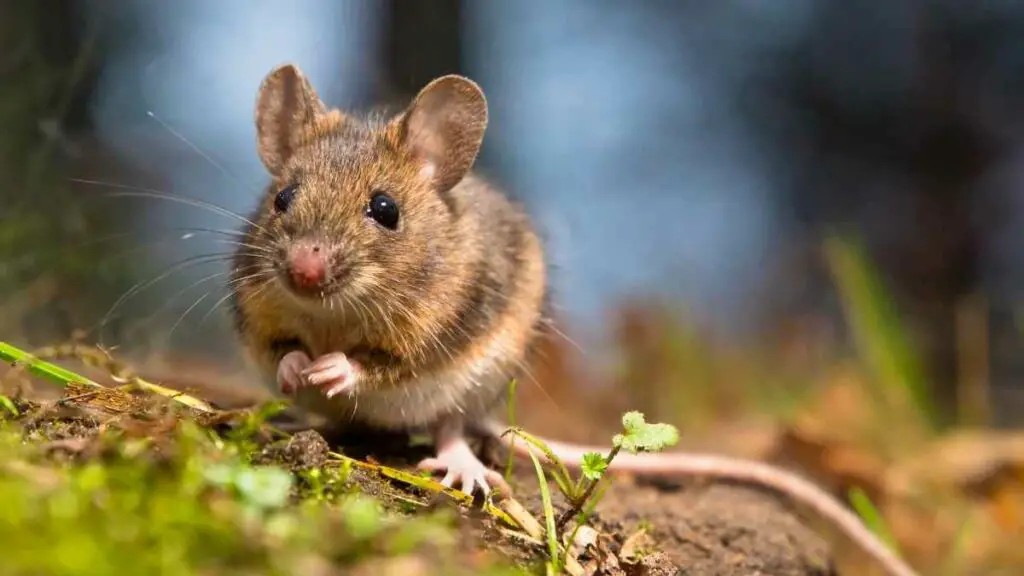
To find out how many mice you have in your home, ‘how long has the mouse been in my house’ is one of the most important questions to answer.
You can do a few things to determine how long you have had a mouse in the house.
- Check for evidence of mice activity
- Listen for mouse-related noises
The odds are that if you have not seen any evidence of mice activity, and you have only seen 1 mouse, then you may have got lucky!
Has The Mouse Built A Nest?
It is essential to hunt throughout your home for nests.
If you cannot find a mouse nest in your home, that is awesome news! It means it has not been in your home long enough to create one.
What Is The Average Litter Size For A Mouse?
The average litter size for a mouse is 6-8.
Why is it important to know the average litter size?
It is essential to know because if you think you have more than 1 mouse in your home and believe they may have set up a nest, you know how many more mice will be in your home.
There is more bad news too! A female reaches sexual maturity at around 6 weeks old. If you have had mice in for longer than 6 weeks, you may have a mouse infestation on your hands! Time to get out the mouse traps and peanut butter (for bait).
So, If You See One Mouse, How Many Do You Have?

You are asking the question now means that you are unlikely to have seen mouse activity before now.
That is good news!
It is good news because it means you have probably caught your mouse problem before they set up home in your house.
The longer you leave the mouse problem, the more chance you have of allowing a family of mice to expand and destroy your home!
If you have noticed mouse activity in your home before and are only asking this question, you should take the average litter size as the answer, plus 1 (female mouse). The answer is 8.
In short:
- If seeing a mouse is the first time you have noticed mouse activity in your home, it is likely only to be 1 mouse.
- If you have noticed signs recently but have ignored them or not realized they are signs, I would suggest the answer is 8.
- As time passes, the mouse population in your home explodes, and it is impossible to count how many.
You will need to check around your home for mouse activity. This is best completed during the day (mice are nocturnal).
Check throughout your house for:
- Mouse droppings
- Urine
- Evidence of nesting
- Gnawed items
The more signs you see, the more chance you have more than one mouse in your house.
1 Mouse Turns Into Many Mice VERY Quickly!
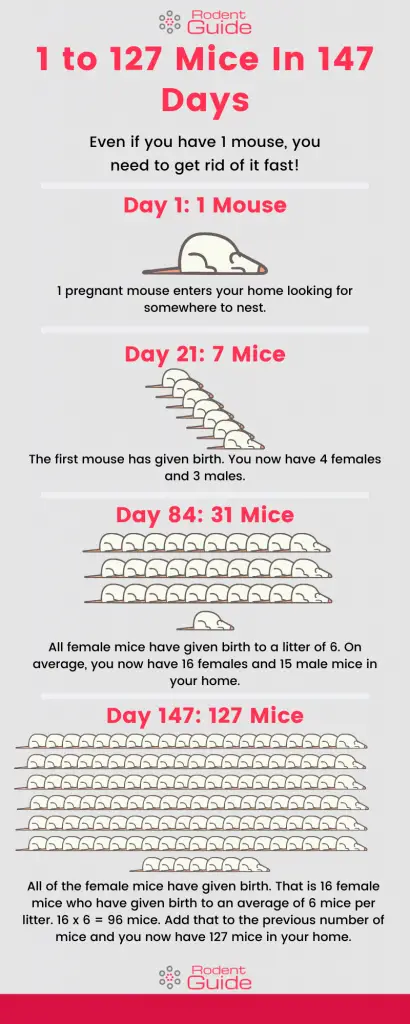
If you have been through the questions on this post and have concluded that you only have 1 mouse, it is fantastic news, congrats!
I want to run you through some math to show you how quickly 1 mouse can turn into a house full. First, we need to make an assumption. You have 1 in your home, and it is a pregnant mouse looking for somewhere to nest.
Day 1: 1 mouse
A female mouse is pregnant for around 21 days. The average litter size for a mouse is 6-8. So let’s assume this litter is 6.
Day 21: 7 mice (4 females, 3 males)
A female mouse reaches sexual maturity in 6 weeks. In 6 weeks, you may have 4 pregnant mice in your home.
Day 84: The 4 pregnant mice have given birth. Assuming that the 4 pregnant mice give birth to 6 mice each, you will have 31 mice in your home. The initial mouse + 6 + 24 (new litters). If we break it down by gender, you now have 16 females and 15 males (on average).
Time for a reminder: in 6 weeks, all female mice will reach sexual maturity.
Day 147: All of the female mice have given birth. That is 16 female mice that have given birth to an average of 6 per litter. 16 x 6 = 96 mice. Add that to the previous number of mice, and you now have 127 mice in your home.
1 mouse to 127 mice can only take 147 days!
I could continue, but I think you get the picture. The message is clear, even if you only have 1 mouse in your home, you should be declaring an all-out war to get rid of it!
Is there ever just one mouse?
The number of mice inside your home depends entirely on how long you have either:
- Not noticed mouse activity
- Ignored the signs of mice
If you catch it as soon as it enters your home, it is likely to only be one mouse in your house. If you have heard noises for some time, there will likely be more!
It is best to react immediately when you hear mice noises and seal those entry points.
Ultimately, the answer depends entirely on when the mouse has been in your home. If it has been in your house for more than 6 weeks, you could easily have a mouse infestation on your hands. However, if you have only found 1 mouse that is now gone, you should continue looking for further evidence of activity.
Check everywhere!
Check all the places mice like to hide in your home.
Leave no stone left unturned. To get rid of mice from your home, you must spend a lot of time investigating. If you don’t do it correctly, you could have a mouse infestation in no time.
Do mice leave on their own?
Mice have been known to leave on their own, yes, but don’t bank on it happening!
It all depends on what you have on offer. If you allow easy access to:
- Food
- Warmth
- Comfort
- Protection
Then the mice will not leave! If anything, you are risking an infestation.
The only time I have known mice to leave without pest control is when all the attractions are removed from the property. They will search for food if they don’t have anything to eat. If they do not feel safe, they seek another area to set up a nest. For instance, the mice will be very fearful if you have a cat in your home! The presence of any predator will make mice afraid of settling down in that area.
Also, just because you are lucky enough to have a mouse that has left on its own, it doesn’t mean that it will not be back, and it doesn’t mean that no other mice will find their way in! Instead, you must spend some time investigating potential entry points around your home. This is the best form of rodent control; take it from me!
I have a monthly task in my diary to check around my house for points of entry. If I find any, they are sealed up immediately! So prevention is better than a cure.
How Many Droppings Does One Mouse Leave?
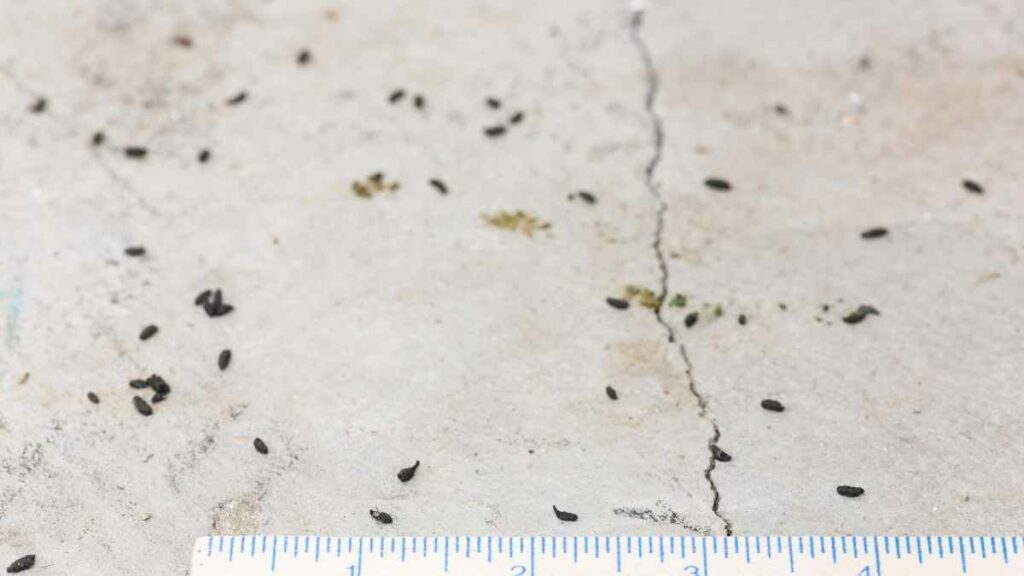
You probably do not want to know the answer to this question, but I will answer it!
A mouse is capable of producing between 50-75 droppings every day.
Not only is that particular stat disgusting, but it also vastly increases the chances that a disease will be transmitted.
Hantavirus is a very nasty disease and is transmitted through mouse droppings. Ultimately, you will want to clean up mouse droppings when you find them. This will reduce the chances of disease transmission. When cleaning mouse droppings, I always wear the following:
- Facemask – to reduce or remove the chances of breathing in dry mouse droppings.
- Feet protectors – I will place plastic bags over my strong boots if I don’t have any.
- Strong gloves – I prefer strong rubber gloves as you can dispose of these once you have cleaned up the droppings.
I will wear a disposable coverall suit if it is a big clean-up job.
Does one mouse mean an infestation?
Not necessarily, no.
One mouse might be a single mouse. You might be lucky!
There is also a chance that you have more mice, which can be considered an infestation. So you need to check to see how many mice you are dealing with by following the advice on this page.
Always record any evidence of mice activity (such as mouse droppings) because you will need that info to increase your confidence that all the mice have gone and you are rodent-free!
Odds of only having one mouse?
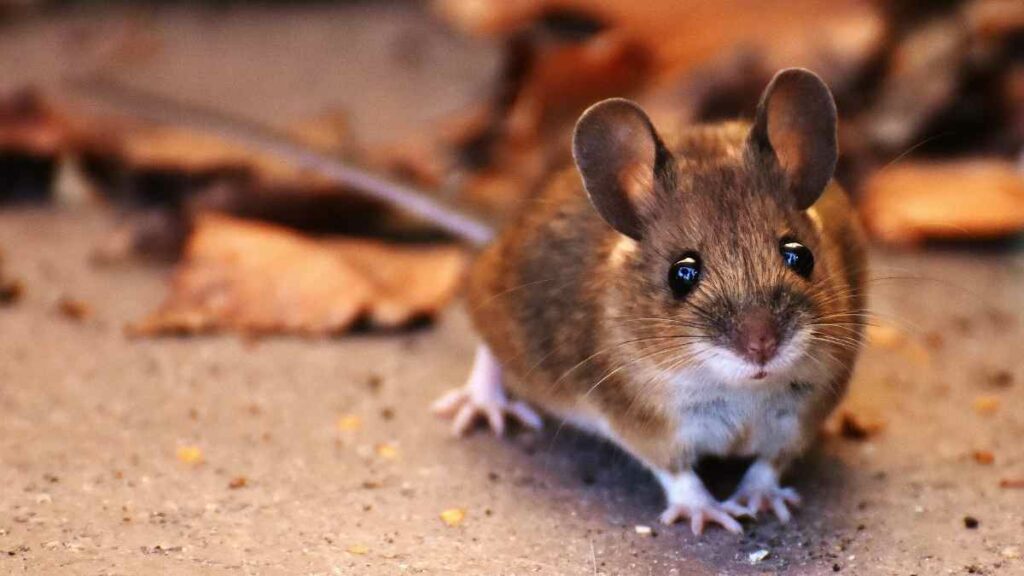
There is no definitive answer to this question as it depends on several factors, such as the size and layout of your home, whether you have any food sources that attract mice, and how good your mouse-proofing efforts are.
However, the odds of only having one mouse in your home are generally relatively low. Mice are known to travel in pairs or even small groups, so it’s likely that if you have seen one mouse, there are more close by. If you do spot a mouse, there are likely more lurking nearby.
To help reduce your chances of an infestation, be sure to seal up any potential entry points and keep food stored in airtight containers.
If you do spot a mouse, try to catch it and release it outside so that it doesn’t become a problem. For example, it might be worth calling a professional pest control company immediately if you see multiple mice or evidence of a nest.
While the odds of having only one mouse in your home are relatively low, it is possible. By taking some simple precautions, you can help reduce the chances of an infestation.
Is it possible to only have 1 mouse in your house?
Yes, it is possible only to have one mouse in your house. So, for example, if you have a cat or another animal that catches mice, you may not need to worry about more than one mouse.
You can also take measures to prevent mice from entering your home in the first place, such as sealing up any holes or cracks that they could use to get inside.
If you see a mouse in your home, try to catch it and release it outside, so it doesn’t become a problem.
Should I be worried if I see one mouse?
There’s no need to panic if you see a mouse in your home. While it’s certainly not ideal, a single mouse is not likely to cause much damage. However, if you see multiple mice or evidence of a nest, that’s a different story.
You should take steps to get rid of the mice as soon as possible, as they will continue to breed and can cause many problems. If you’re unsure how to get rid of mice, your best bet is to call a professional pest control company.
They will be able to get rid of the mice quickly and efficiently, ensuring that your home is safe and mouse-free.
Conclusion
After reading this article, you are now in a much better place to understand how many mice you have and address any mouse infestation you may have.
When writing this article, what concerned me most of all was the math to figure out how quickly 1 mouse can turn into 147 mice in 127 days. I am not going to lie; that sent a few shivers down my spine! Imagine taking that many mice one… your home will be destroyed!
If you notice 1 mouse enter your home, get rid of it quickly. And don’t be fooled if you do not hear any noise during the day, because mice are nocturnal.
It is important to remember that mice and mice feces can transmit some nasty diseases. Mouse droppings can be dangerous!
With that in mind, it is vital to ensure that you follow an excellent pest control guide to get rid of mice. Stop mice from getting in, sure up those entry points, and you are winning the war!
Good luck!

